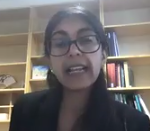Abstract
Recent advances in both experimental and computational techniques pose an exciting yet challenging time for chemistry. Current computational methods enable chemists to interrogate chemical processes at the molecular level. Despite these advances, several challenges remain when exploring unusual reactivity and/or targeting novel catalysts. Among them i) the accurate description of both electronic and energetic properties, i.e. obtaining the right answers for the right reasons, ii) the efficient modelling of structurally dynamic systems, and iii) the efficient evaluation of novel catalysts.
In this talk, I will discuss our ongoing efforts to build systematic protocols for predicting reactivity and catalysis in different molecular processes. Our approach focuses on a detailed understanding of the fundamental chemistry behind these reactions and the development of efficient workflows to automate further explorations. I will first present examples in the area of physical organic chemistry, where our models have allowed us to understand the stability and reactivity of strained molecules. Secondly, I will discuss the effect of non-covalent interactions and flexibility on biomimetic catalysis, and our recent computational developments on the design of such systems.
If you are interested in attending this seminar, please, register here!
